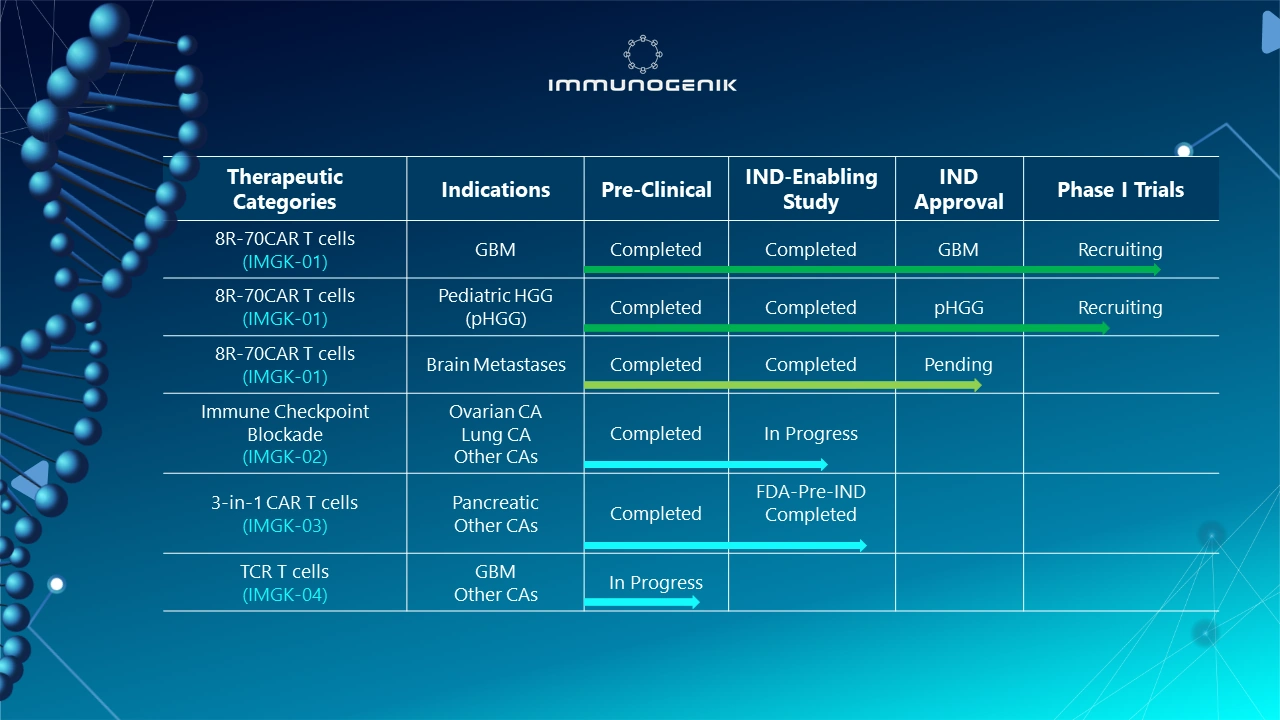Immunogenik is a clinical-stage biotechnology company advancing next-generation immunotherapies to treat aggressive cancers. Our multi-platform strategy is designed to overcome the fundamental mechanisms of immune resistance that limit current therapies. By reprogramming the tumor microenvironment, we address immuno-suppression, enhance CAR T-cell trafficking and persistence, and block myeloid checkpoint–mediated inhibition, unlocking durable responses in both solid tumors and hematologic malignancies.
Immunogenik holds exclusive option agreements to the underlying technologies, ensuring a strong intellectual property position as we advance toward clinical and commercial translation.
The video (https://doi.org/10.1016/j.actbio.2023. 09. 042) shows CD70 CAR T cells (green) attacking and killing glioblastoma tumor cells (red).
Platform 1: 8R-70CAR T-Cell Therapy
Overview
8R-70CAR combines CD70 targeting with an IL-8 receptor modification to overcome barriers of solid tumor entry and enhance therapeutic efficacy.
Scientific and Clinical Highlights
Technology Origin
Developed in Dr. Jianping Huang's academic lab at the University of Florida, this technology is under an exclusive option agreement with Immunogenik for licensing.
Platform 2: LAIR1 Antibody Blockade Therapy
Overview
aLAIR1 is a humanized monoclonal antibody that blocks LAIR1, a key immune-inhibitory receptor on tumor-associated myeloid cells. LAIR1 blockade reshapes the tumor microenvironment, reduces immune suppression, and enhances antitumor response.
Scientific and Clinical Highlights
Technology Origin
aLAIR1 was developed in Dr. Huang's academic research program. Immunogenik holds an exclusive option agreement with the University of Florida for the licensing rights to this platform. This next-generation technology is supported by an NIH STTR award.
Platform 3: 3-in-1 CAR T-Cell Therapy
A multifunctional CAR T-cell platform engineered to overcome tumor immune resistance by integrating antigen recognition, enhanced T-cell trafficking, and intrinsic immune checkpoint blockade. This next‑generation technology is currently in IND‑enabling development and is supported by an NIH STTR award, including Technical and Business Assistance (TABA) resources to accelerate commercialization planning and regulatory strategy.
Immunogenik is also exploring T-cell receptor (TCR)-based therapies for intracellular tumor antigens in solid and hematologic cancers. This work is in the early discovery phase and is being developed in collaboration with academic research at the University of Florida. Future licensing opportunities will be evaluated as the platform matures.
Haipeng Tao, et al
Linchun Jin, et al.
Ezri P. Perrin, et al
Linchun Jin, et al.
Duy T. Nguyen, et al
